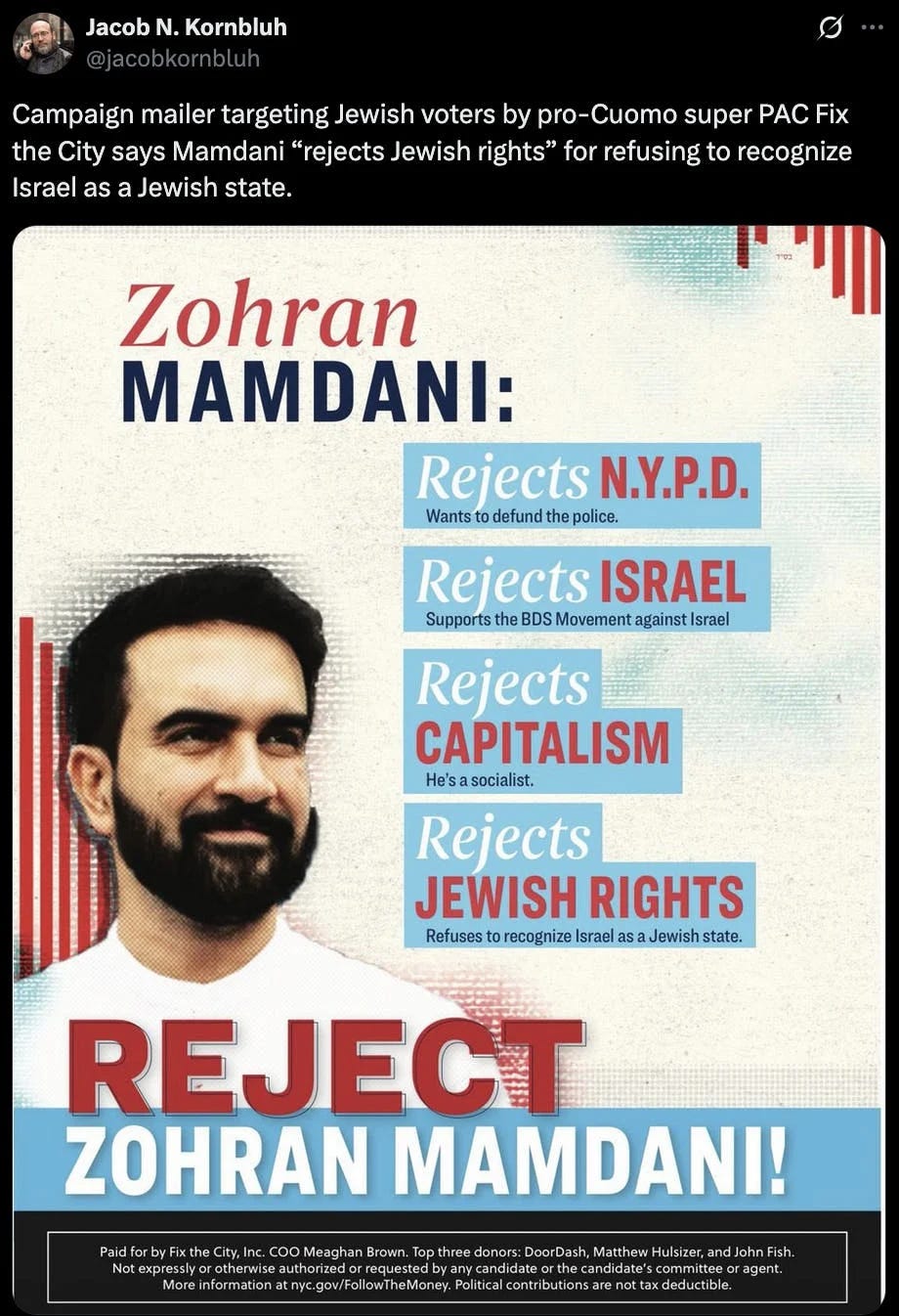DoorDash Burned Millions Trying to Buy a Mayor
The real lesson of the Mamdani-Cuomo upset is that power forgot how to read the room and the working class finally read it back.
I don’t know how I missed this even though I am chronically online.
DoorDash spent over a million dollars trying to make Andrew Cuomo the next mayor of New York City. He lost. Badly. As we all know.
The money went to a super PAC, “Fix the City,” which marketed Cuomo as the sensible candidate for a chaotic era. It was supposed to be a slam dunk: a disgraced but known name, corporate backing, and the veneer of law-and-order pragmatism.
Read the fine print in the image below:
Instead, the city picked Zohran Mamdani, a 33-year-old democratic socialist who ran on raising wages, regulating apps, and putting delivery workers at the center of urban policy.
When politics becomes performance, power forgets how to govern. But something stranger is happening now. The performance is no longer convincing. The audience is leaving the theater. And sometimes, they’re storming the stage.
For years, corporations like DoorDash have operated in a suspended moral reality where lobbying dollars doubled as PR, and economic violence wore the mask of innovation.
They called it the future of work. They called it empowerment. But in cities like New York, that future is now arriving and it looks like 80,000 delivery workers with no minimum wage, no safety protections, and no rights.
Mamdani didn’t win because he outspent anyone. He won because the illusion cracked. He spoke directly to the people the system forgot and more importantly, to the people the system exploited to fund itself.
Let’s walk through how the incentives were supposed to work.
Start with classification: Delivery workers aren’t employees.
They’re “independent contractors.” That one legal fiction unlocks everything. No benefits, no overtime, no collective bargaining. The apps extract value while offloading every cost: gas, injuries, downtime, insurance, even bathroom breaks.
Now add scale. These workers generate billions in annual value. But because each one is legally framed as a small business, the platforms can deny them basic protections while pretending to empower them. You’re not being exploited, you’re an entrepreneur, they say.
Then comes the final layer: political insulation.
DoorDash spends heavily to lobby against regulations. It funds think tanks, sues over wage laws, and floods local elections with cash. It wraps these efforts in the language of freedom, efficiency, and consumer choice. Any policy that might rebalance the relationship — wage floors, tip transparency, cap fees — is framed as an attack on innovation.
That was the Cuomo bet. He was the perfect candidate for this arrangement. He could talk like a populist while governing like a landlord. He had name recognition, elite media connections, and zero interest in labor reform.
But the machine misread the room.
Mamdani, backed by Los Deliveristas Unidos, a worker-led group of app-based delivery riders, flipped the story.
He detailed the grind: breakneck speeds, e-bike deaths, wage theft, retaliatory app updates.
His campaign offered actual policy: $30 minimum wage, expanded delivery hubs, licensing requirements for the platforms.
And that’s what scared the system. Not the slogans. The specificity.
Markets misprice not because of ignorance, but because of narrative traps. They assume the past will repeat. They price in comfort, not reality.
DoorDash thought it could buy a mayor because that’s how it’s always worked. Find a moderate. Flood the zone. Tell a story about progress and prosperity. Let the checkbooks do the talking.
But that strategy assumed the voters would remain quiet. That workers wouldn’t organize. That the performative centrism of Cuomo, the slick TV ads, the endorsements, the million-dollar burn rate, would drown out the lived reality of 65,000 men and women biking through storms, dodging cars, and hoping for tips that don’t disappear.
What happens when the cost of illusion becomes greater than the cost of truth?
That’s where we are now. DoorDash was betting on apathy.
It lost.
This election was about the collapsing price of political spectacle. About how capital overreached and labor, for once, noticed. And about how the old machine — endorsements, donations, handshakes — can still be outflanked by clarity.
Don’t mistake this for a revolution. Power adapts. Mamdani will face resistance, obstruction, maybe even sabotage. Cuomo might run as an independent. DoorDash will revise its messaging and re-target its spend.
But something happened here that’s hard to unsee.
A corporation tried to buy the city. And the city, for once, told it to go deliver somewhere else.






